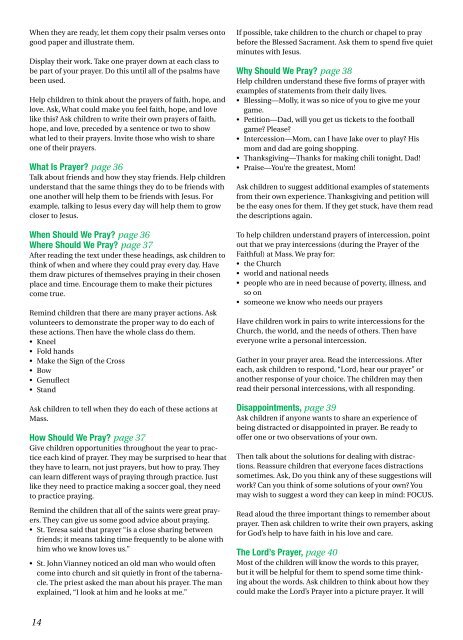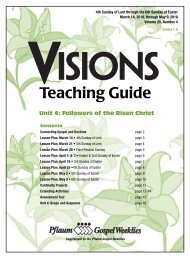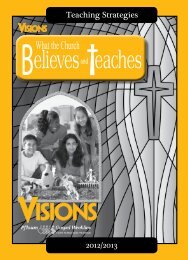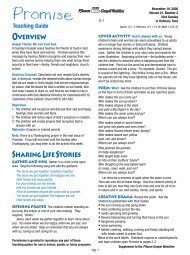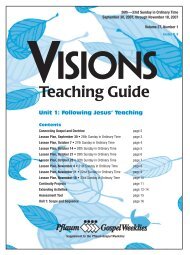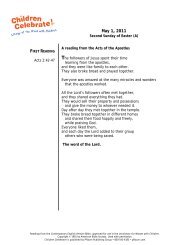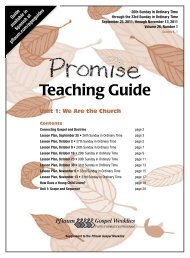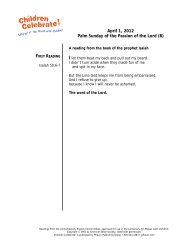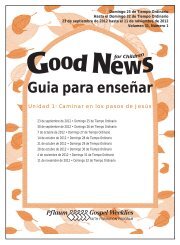Good News - Pflaum Gospel Weeklies
Good News - Pflaum Gospel Weeklies
Good News - Pflaum Gospel Weeklies
You also want an ePaper? Increase the reach of your titles
YUMPU automatically turns print PDFs into web optimized ePapers that Google loves.
When they are ready, let them copy their psalm verses onto<br />
good paper and illustrate them.<br />
Display their work. Take one prayer down at each class to<br />
be part of your prayer. Do this until all of the psalms have<br />
been used.<br />
Help children to think about the prayers of faith, hope, and<br />
love. Ask, What could make you feel faith, hope, and love<br />
like this? Ask children to write their own prayers of faith,<br />
hope, and love, preceded by a sentence or two to show<br />
what led to their prayers. Invite those who wish to share<br />
one of their prayers.<br />
What Is Prayer? page 36<br />
Talk about friends and how they stay friends. Help children<br />
understand that the same things they do to be friends with<br />
one another will help them to be friends with Jesus. For<br />
example, talking to Jesus every day will help them to grow<br />
closer to Jesus.<br />
When Should We Pray? page 36<br />
Where Should We Pray? page 37<br />
After reading the text under these headings, ask children to<br />
think of when and where they could pray every day. Have<br />
them draw pictures of themselves praying in their chosen<br />
place and time. Encourage them to make their pictures<br />
come true.<br />
Remind children that there are many prayer actions. Ask<br />
volunteers to demonstrate the proper way to do each of<br />
these actions. Then have the whole class do them.<br />
• Kneel<br />
• Fold hands<br />
• Make the Sign of the Cross<br />
• Bow<br />
• Genuflect<br />
• Stand<br />
Ask children to tell when they do each of these actions at<br />
Mass.<br />
How Should We Pray? page 37<br />
Give children opportunities throughout the year to practice<br />
each kind of prayer. They may be surprised to hear that<br />
they have to learn, not just prayers, but how to pray. They<br />
can learn different ways of praying through practice. Just<br />
like they need to practice making a soccer goal, they need<br />
to practice praying.<br />
Remind the children that all of the saints were great prayers.<br />
They can give us some good advice about praying.<br />
• St. Teresa said that prayer “is a close sharing between<br />
friends; it means taking time frequently to be alone with<br />
him who we know loves us.”<br />
• St. John Vianney noticed an old man who would often<br />
come into church and sit quietly in front of the tabernacle.<br />
The priest asked the man about his prayer. The man<br />
explained, “I look at him and he looks at me.”<br />
If possible, take children to the church or chapel to pray<br />
before the Blessed Sacrament. Ask them to spend five quiet<br />
minutes with Jesus.<br />
Why Should We Pray? page 38<br />
Help children understand these five forms of prayer with<br />
examples of statements from their daily lives.<br />
• Blessing—Molly, it was so nice of you to give me your<br />
game.<br />
• Petition—Dad, will you get us tickets to the football<br />
game? Please?<br />
• Intercession—Mom, can I have Jake over to play? His<br />
mom and dad are going shopping.<br />
• Thanksgiving—Thanks for making chili tonight, Dad!<br />
• Praise—You’re the greatest, Mom!<br />
Ask children to suggest additional examples of statements<br />
from their own experience. Thanksgiving and petition will<br />
be the easy ones for them. If they get stuck, have them read<br />
the descriptions again.<br />
To help children understand prayers of intercession, point<br />
out that we pray intercessions (during the Prayer of the<br />
Faithful) at Mass. We pray for:<br />
• the Church<br />
• world and national needs<br />
• people who are in need because of poverty, illness, and<br />
so on<br />
• someone we know who needs our prayers<br />
Have children work in pairs to write intercessions for the<br />
Church, the world, and the needs of others. Then have<br />
everyone write a personal intercession.<br />
Gather in your prayer area. Read the intercessions. After<br />
each, ask children to respond, “Lord, hear our prayer” or<br />
another response of your choice. The children may then<br />
read their personal intercessions, with all responding.<br />
Disappointments, page 39<br />
Ask children if anyone wants to share an experience of<br />
being distracted or disappointed in prayer. Be ready to<br />
offer one or two observations of your own.<br />
Then talk about the solutions for dealing with distractions.<br />
Reassure children that everyone faces distractions<br />
sometimes. Ask, Do you think any of these suggestions will<br />
work? Can you think of some solutions of your own? You<br />
may wish to suggest a word they can keep in mind: FOCUS.<br />
Read aloud the three important things to remember about<br />
prayer. Then ask children to write their own prayers, asking<br />
for God’s help to have faith in his love and care.<br />
The Lord’s Prayer, page 40<br />
Most of the children will know the words to this prayer,<br />
but it will be helpful for them to spend some time thinking<br />
about the words. Ask children to think about how they<br />
could make the Lord’s Prayer into a picture prayer. It will<br />
14


